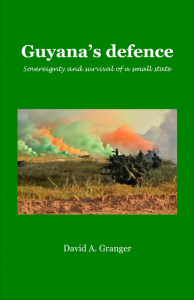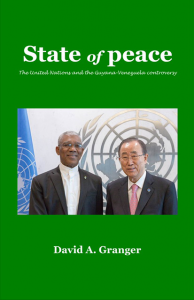A REVIEW of David Granger’s The security of small states in the international system; State of Peace: The United Nations and the Guyana-Venezuela controversy; and Guyana’s Defence: Sovereignty and survival of a small state.
David Granger was elected President of the Cooperative Republic of Guyana on 11th May, 2015. The Bolivarian Republic of Venezuela issued a decree purporting to annex the greater part of Guyana’s territorial waters on the day of the celebration of his inauguration with a ceremony at the country’s national stadium; it was a provocative act. For more than 50 years, Venezuela had laid claim to almost two-thirds of Guyana’s territory and, by extension, most of its petroleum-rich territorial waters.
Venezuela, if it had expected to intimidate the new Guyanese President, had its hopes dashed. If it had anticipated that the President would placate their aggression, it must have underestimated the resolve of the former Brigadier, now President, who stood defiant. David Granger marshalled his political resources and launched a diplomatic counter-offensive immediately.
 This three-book collection highlights some of the diplomatic and non-diplomatic initiatives which the President undertook to defend his country’s territory and protect its sovereignty. The collection is an exposition in the art of statecraft. It shows how small states, limited in military might, can use soft power to advance their defence.
This three-book collection highlights some of the diplomatic and non-diplomatic initiatives which the President undertook to defend his country’s territory and protect its sovereignty. The collection is an exposition in the art of statecraft. It shows how small states, limited in military might, can use soft power to advance their defence.
Guyana, historically, has deployed diplomacy as a first line of defence against Venezuela’s threats. Guyana, unable to match Venezuela’s military might, sought to win the support and solidarity of international organisations such as the Caribbean Community (CARICOM), the Commonwealth and the United Nations and sympathetic states that subscribe to the principles of international law, including respect for a country’s territorial integrity and sovereignty and the peaceful settlement of disputes.
President Granger’s address to the United Nations General Assembly in September 2015 provided him with a grand stage to present his case before the international community. He did more than that. The President, in an absorbing address, told the international community not only how his country was being threatened but, also, he made a convincing case as to why the United Nations had an obligation to protect small states.
It was no coincidence that, at the same time that the President was making his diplomatic debut, his country was petitioning the UN Secretary-General to use his powers under the Geneva Agreement of 1966 – an accord signed with Britain, the country’s former colonial ruler and Venezuela – to place the controversy before the International Court of Justice (ICJ).
The security of small states in the international system – the first book in President Granger’s collection constitutes the text of his maiden address to the United Nations General Assembly. Its timing, occurring on the 7oth anniversary of the United Nations when there was much reflection on the work of the institution, was exquisite.
The Guyanese leader, in this book, asks and answers the question as to how peace could be guaranteed in the face of threats to the world’s peoples and states, particularly small, independent states. His address has earned him a reputation as one of the world’s foremost spokespersons for small states. Its universal message was that the United Nations had an obligation to protect small states.
State of Peace: The United Nations and the Guyana-Venezuela controversy, the second book, emphasises also the United Nations’ role as a guarantor of peace. The book provides a concise background to the controversy between the two states. It chronicles the acts of aggression committed against Guyana by Venezuela and iterates Guyana’s support for the Region as a zone of peace. It is written, expectedly, from a Guyanese perspective.
State of Peace brings greater awareness to the plight of Guyana as a small state which has been subject to acts of aggression by Venezuela for the greater part of its post-independence history. It elicits sympathy for the country’s protests that it is a victim of foreign aggression.
Guyana, however, not only protests. It relies not solely on international solidarity to help deflect the Venezuela threat. The country is also prepared to detect and deter threats of invasion to its territory.
 The question is, how does a state as small as Guyana, with limited financial and military capabilities, protect itself against Venezuela – a formidable enemy which is four times its size and has armed forces 40 times those of the Guyana Defence Force – in this asymmetric relationship?
The question is, how does a state as small as Guyana, with limited financial and military capabilities, protect itself against Venezuela – a formidable enemy which is four times its size and has armed forces 40 times those of the Guyana Defence Force – in this asymmetric relationship?
Guyana’s Defence: Sovereignty and survival of a small state, provides the answer in the third book. President Granger presents his strategy of total national defence – one in which all the elements of state power are applied to national defence. The doctrine is the basis of the country’s restructuring of its Defence Force in order to respond to any aggression.
Total national defence has its limitations. It relies on the mobilisation of all elements of national power. If that power is enfeebled then, logically, such a mobilisation of all elements of national power would hardly be impactful. But that is all Guyana has at the moment.
The President’s response to Venezuela’s provocation has been successful. The United Nations’ Secretary-General agreed to refer the Guyana-Venezuela territorial controversy to the International Court of Justice. Arguments on the court’s jurisdiction are being heard at present. Guyana is confident that the court will rule in its favour.
When that time comes, the nation will owe an enormous debt of gratitude to David Granger’s shrewd statecraft. He has achieved what no other leader before him has done – having the dispute referred for juridical settlement.
The three-book collection is a powerful testament to the President’s persistent efforts to rid his country of a threat which has impeded its development for more than 50 years. The collection is a rich addition to the literature on small states. It carves out a unique niche because it addresses – directly — the issue of the security of small states, a field of study which deserves deeper study in international politics.



.jpg)










